Try our favorite, clean protein powder: See our top pick →
Try our favorite, clean protein powder: See our top pick →
This post contains links through which we may earn a small commission should you make a purchase from a brand. This in no way affects our ability to objectively critique the products and brands we review.
Evidence Based Research To fulfill our commitment to bringing our audience accurate and insightful content, our expert writers and medical reviewers rely on carefully curated research.
Read Our Editorial Policy
Welcome to our nuPasta review!
We’re well aware that “plant-based pasta burnout” is very much a thing at this stage of the low-carb noodle game, but every once in a while, someone jolts the sleeping giant awake with an exceptional product.
Such is the case with nuPasta, a Toronto-based brand specializing in konjac-based noodles that appeal to a Western audience with classic styles like spaghetti, fettuccine, angel hair, and risoni.
It also helps that they’re trouncing standard wheat pasta when it comes to calories (a whopping 90% or so fewer), carbs, and fiber content.
If you’re looking for some tasty, gluten-free, diabetic-friendly noodles, nuPasta just might make the difference between ditching pasta altogether (audible sobbing) and keeping your love of noodles very much alive.
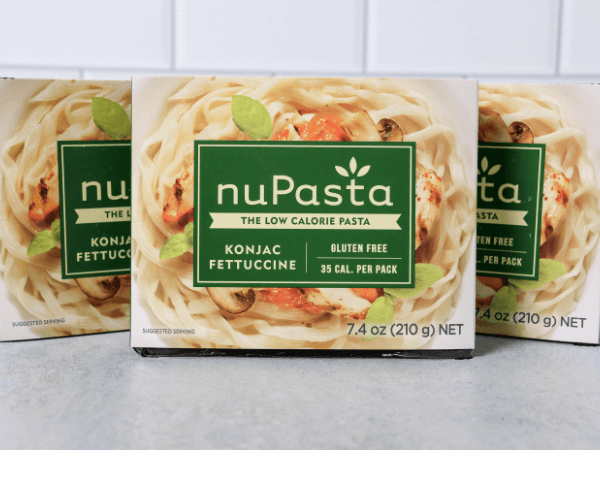
We were initially a bit skeptical about a konjac noodle replicating the flatter, ribbon-like shape of fettuccine, but nuPasta made it happen.
Creamy alfredo is highly recommended, of course, but tomato or pesto sauce are certainly a welcome addition to these tasty noodles.
As with the rest of nuPasta’s offering, these noodles are super low in calories (35 a pack!), high in fiber, and gluten-free.
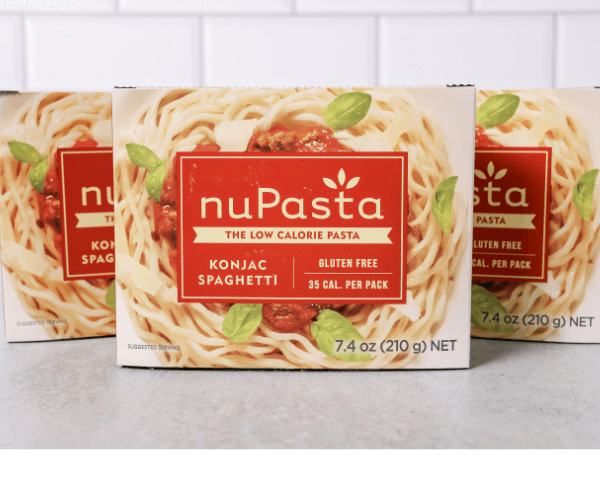
The pinnacle of East meets West in the noodle world has to be nuPasta’s take on “shirataki spaghetti.”
Indeed, these konjac noodles nail the taste and texture of (quite al dente) spaghetti, and go great with any spaghetti sauce.
This product is certified kosher and halal, and is made with konjac, water, and non-GMO soy.
Born in Japan more than a millennium ago, konjac noodles—typically called shirataki—aren’t new by any means.
The konjac plant from which these noodles are derived grows way above sea level (typically 2,000 to 4,000 feet), most prevalently in Japan, Korea, and China.
Since the Japanese began taking advantage of this filling fiber source, they’ve created several varieties of konjac-based foods collectively referred to as “konnyaku.”
But despite the deep-rooted history of this plant and its ongoing success in China, Japan, and other Asian countries, konjac pasta is still working to break out of niche status in the USA and Canada.
The manufacturer said, “Hey, we have this product that is very pasta-like, made with konjac. It’s very low in calories; an excellent pasta alternative.”
Jonathan Leung, Marketing Director for nuPasta
This is where nuPasta comes in.
It all started with two cyclists struggling to maintain an ideal weight: co-founders Stephen and Johnny.
Fortuitously, not long after the founders realized the numbers on the scale were moving in the wrong direction, the food import company that Johnny owned and operated asked him if he had any interest in konjac noodles.
As Marketing Director Jonathan Leung explained to us in an interview, “The manufacturer said, ‘Hey, we have this product that is very pasta-like, made with konjac. It’s very low in calories; an excellent pasta alternative.’”

Realizing the potential, the founders fervently researched the product, developed packaging, and officially launched nuPasta in Canada in 2015, debuting at a trade show.
“At the trade show, we had people come up to us and say, ‘Hey, I haven’t had pasta for 10 years because I’m a diabetic—this is amazing,’” Leung told us.
With Founder Stephen Cheung—whom we met with at Natural Products Expo East 2022—at the helm, nuPasta continued putting their own “spin” (you’ll get it in a minute) on classic konjac noodles in the hopes of getting North America on board.
“A lot of the gluten-free products on the market are soft,” Cheung explained to us, “but we are very firm.”
“At the trade show, we had people come up to us and say, ‘Hey, I haven’t had pasta for 10 years because I’m a diabetic—this is amazing.’”
Jonathan Leung, Marketing Director for nuPasta
After nuPasta became the #1 selling pasta alternative in Canada, they decided to bring their products to the United States in early 2020, to which COVID said, “Yeah, no, pause that.”
Needless to say, it’s been a bit of a slower climb in the United States, but nuPasta has shoved their foot in the door as far as brick-and-mortar retail distribution goes (Gelson’s in California, SpartanNash, and Sprouts).
And that brings us to the nuPasta of today, which continually strives to reach increasingly carb- and calorie-conscious Americans one sample at a time.
Every brand we review is assessed according to these six criteria (nuPasta’s grades included):
All tallied, nuPasta earns an overall rating of A-, with their product quality (including manufacturing and certification standards) and highly responsive customer service putting on a particularly strong showing.
Enough preamble, let’s get into the review!
Grade: A+
Extremely clean and accommodating ingredient lists (gluten-free, keto-friendly, diabetic-friendly) stand out alongside reliable sourcing and manufacturing methods in the quality department for nuPasta.
While taste and texture are obviously integral to quality, we also factor in ingredient quality, certifications, sourcing and manufacturing standards, and more to gain a more comprehensive picture of true quality.
Starting with what each customer encounters first—the packaging—each order of nuPasta is packaged in a plastic tray sealed with a clear film.
The shelf-stable noodles are kept in water (hence the tight seal), and each 7.4oz tray is housed in a sleeve that displays nutrition facts and ingredients, a blurb about the product, certification seals, cooking instructions, and more.
None of our packages arrived damaged, and the seals are very strong, to the point where we just opted to puncture them instead of trying to peel them off.
The ingredient list for every nuPasta product is as follows: water, konjac root, and non-GMO soy. Easy.
Understandably, the nutrition facts are also consistent across products; the three that we sampled (spaghetti, fettuccine, angel hair) had:
*Per 7.4oz serving (full package)

While this certainly doesn’t constitute a nutritionally dense meal, with respect to the context—filling in for wheat-based pasta—nuPasta leaves zero doubt that they are the (far) less problematic option. And to their credit, 6 grams of fiber (21% RDA) is nothing to scoff at.
As for the behind-the-scenes stuff, nuPasta sources their konjac from China and Indonesia. Japan is a net importer of konjac, Jonathan explained, because of the consistently high demand.
On the processing side, nuPasta works with a contract manufacturing operation in Shenzhen, China, which they have had close ties to for 30 years through their other ventures.
After the tulip-like, perennial konjac plant matures (which takes 2-3 years), the fiber-rich root is shaved off and carved into slivers.
Then, the slivers are air-dried, crushed into a powder, and spun in a centrifuge to separate the starch—which nuPasta doesn’t use—from the fiber, which is called konjac glucomannan.
The final phase involves adding water and soy to the fiber, cooking the mixture, and extruding it into a water bath, which is how the pasta-like noodles are formed.
Like tofu, Jonathan said, the product needs to stay in water, lest it dry up and become shriveled.
Taking into account the extremely clean ingredients, product certifications, and the fact that nuPasta opens doors to so many communities that can’t have wheat pasta (keto, diabetics, gluten-free, etc.), they earn an A+ for quality.
Here’s a closer look at the nuPasta catalog.
As mentioned, nuPasta has 4 unique SKUs, each with an organic and non-organic version.
They also offer two assorted bundles (one organic, one non-organic), which come with three of one kind, three of another kind, and two of a third kind of pasta instead of all eight being the same.

The pinnacle of East meets West in the noodle world has to be nuPasta’s take on “shirataki spaghetti.”
Indeed, these konjac noodles nail the taste and texture of (quite al dente) spaghetti, and go great with any spaghetti sauce.
This product is certified kosher and halal, and is made with konjac, water, and non-GMO soy.

We were initially a bit skeptical about a konjac noodle replicating the flatter, ribbon-like shape of fettuccine, but nuPasta made it happen.
Creamy alfredo is highly recommended, of course, but tomato or pesto sauce are certainly a welcome addition to these tasty noodles.
As with the rest of nuPasta’s offering, these noodles are super low in calories (35 a pack!), high in fiber, and gluten-free.
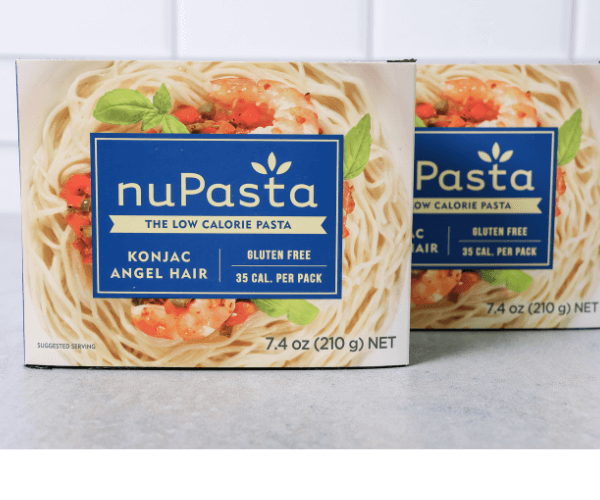
The firmness of nuPasta really stands out in the case of their angel hair product, but hey, if that’s your preference, these are perfect.
We realize this is a heavily anglicized (er, “italicized?”) version of most Asian noodle varieties, but if you did want to get down with some chopsticks, here’s your opportunity.
Plus, they’re surprisingly filling, low in calories, and high in fiber.
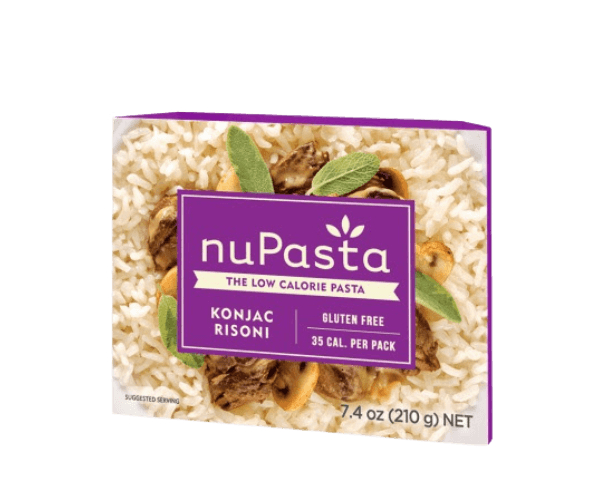
The most versatile of nuPasta’s selection, the risoni can be used pretty much anywhere rice can: as a side, in soups, worked directly into dishes, and more.
Rest assured, changing the shape from noodles to rice didn’t affect the strikingly low calorie content – still just 35 a package.
Best of all, you’ve got rice in five minutes without having to resort to the microwave!
Grade: B+
It’s easy to learn about nuPasta’s products and how they are made, but background information on leadership is very sparse.
The easier it is to learn about a brand, their products, and how/why they do what they do, the more trust that brand will build with potential customers and reviewers like ourselves.
nuPasta’s product pages are very minimalistic, but they do provide handy calorie and macronutrient comparisons (nuPasta vs standard pasta), as well as a basic rundown of product certifications, storage, and proper use.
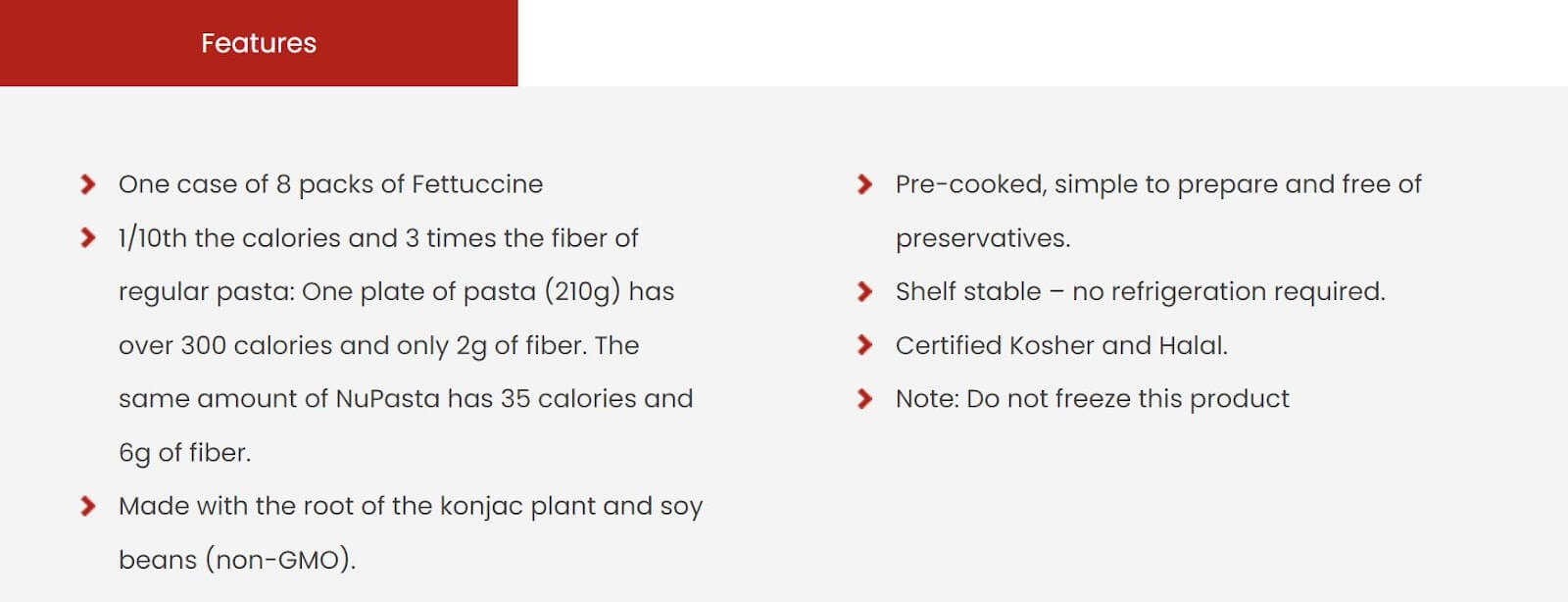
What the product pages miss in terms of background information, the What Is Konjac? and What Is nuPasta? pages largely make up for with deeper dives into the plant, the process, and the product.
As mentioned, our interview with Jonathan Leung and Theo Cheung (whose father is co-founder Stephen) also revealed much about how the product is sourced and manufactured.
Aside from a couple of sentences on this blog post, however, there is literally no (specific) information on the founders, the leadership, and other members of the team.
Finally, the return policy is easy to find, and in addition to refunding unopened products, nuPasta offers a satisfaction guarantee.
Overall, the nuPasta site (and the team) effectively explains the product and how it is made, but more exposition on the team itself would be a very welcome addition.
We give nuPasta a B+ for transparency.
Grade: B+
It’s easy to learn about and shop products on the nuPasta site, though a few formatting issues made accessing some pages a little less convenient.
Ease of use (including shopping) and the depth and breadth of educational content on the website take priority in this category.
The nuPasta online shop is very easy to access and navigate; the four unique SKUs—8 when you include organic versions—allow for a one-page shop
The overall design and e-commerce features are a tad dated, but still, it was very easy to select products, add to cart, and check out.
The mobile version of the site displays some irregularities in the font on a few pages, like their nuPasta for Fitness page. And while the site header is “sticky” on the desktop version (the red banner featuring the navigation links sticks to the top of the page as you scroll down), the non-sticky header of the mobile version takes this convenience away.
Finally, considering the product is basically centered around one ingredient, we found the knowledge base to be both well-established and approachable.
Between the What Is nuPasta? page/video, the What Is Konjac? page, the (admittedly dated) blog, and the Science and Evidence page displaying konjac research findings, plant-based pasta newbies have plenty of resources at hand to form a clear understanding of the product.
Balancing the strengths and weaknesses, we arrived at a B+ for website experience.
Grade: A
nuPasta customer service provided a very quick, helpful response to our questions, and the shipping/return policies are flexible and accommodating.
Until the robots fully take over, we will continue to uphold human-to-human interaction of some form as the pinnacle of customer service. We also give credit in this category for clarity and flexibility of shipping/return policies.
nuPasta lists a phone number, email, their Facebook, and their Twitter as contact options.
Our inquiry sent via email was responded to within 15 minutes, and the response was both thorough and friendly.
All nuPasta customers are eligible for free shipping, but the downside is that you have to purchase products in increments of 8 if you’re buying online.
As mentioned in the transparency overview, the return policy and satisfaction guarantee seem to clash a bit, but at the very least, you can return unused products for a full refund.
For the promptness and quality of the response, the availability of various support services/contact options, and fairly generous shipping and return policies, we give nuPasta an A for customer service.
Grade: A-
We expected nuPasta to be significantly pricier than wheat-based pasta, and it was, but the price fares well against competing, high-quality shirataki products.
Going beyond raw price alone to more clearly assess the true value of a product requires answering these three questions:
All four of nuPasta’s (non-organic) varieties—Spaghetti, Fettuccine, Angel Hair, and Risoni—are priced at $34.32 per 8-count order, which reduces to $0.53/oz ($4.29/package).
Miracle Noodle, a very close competitor in terms of ingredients and overall quality, charges $0.57/oz (angel hair).
You’ll also find a larger subset of shirataki noodle brands available at most grocery stores for around 20-30% less than the mid-$0.50/oz mark, but the vast majority of these have less fiber and/or more carbohydrates due largely to processing differences.
As for the ingredient quality relative to price, all we have to assess besides water and non-GMO soy is konjac, which has proven itself on nutrition labels as a natural, high-fiber, low-calorie option.
This leads us to the final point, which is where nuPasta really excels: the value of the solution.
Thanks to nuPasta, diabetics, gluten-free people, and the keto crowd can all help themselves to a piping hot bowl of pasta where they couldn’t have otherwise, as can anyone simply looking for opportunities to cut calories/carbs without the misery.
Balancing these three key factors, we arrive at a value score of A- for nuPasta.
Grade: A-
While popularizing their innovative konjac noodle products throughout North America, nuPasta has allied with several organizations that serve key public health initiatives, making an impact larger than their size might suggest.
This is where we cast a wider net in order to encompass everything that makes the reviewed company an asset to its industry and any other communities it has engaged with, including:
nuPasta obviously can’t claim credit for inventing shirataki noodles, but the way they’ve likened them more closely to Western-style pasta while working diligently to popularize them on this side of the world counts towards innovation in our book.
Realizing their utility for certain communities with voluntary or medically necessitated dietary constraints, nuPasta has worked closely with Diabetes Canada, Dieticians Canada, Celiac Association, and other government-based groups.
It will take more than one review for us to become konjac farming experts, but from what we could tell, nuPasta’s konjac growers strive for as sustainable a model as possible.
Finally, the product itself is highly disruptive to the wheat-based pasta industry, offering a calorie-slashed, fiber-rich alternative suggested by research to reduce LDL cholesterol, enhance digestive health, regulate blood glucose levels, and more.
They may not be putting up some of the ridiculous numbers that wheat-based pasta giants are in terms of sales, charitable donations, and so forth, but nuPasta has made quite the dent for their size.
All this considered, nuPasta earns an A- for brand value.
Already having a basic impression after sampling nuPasta noodles at Expo East 2022, our review team aimed to switch up the sauces, seasonings, and accompanying dishes for a more well-rounded picture of the product.
We tested all of the non-organic products except for the risoni—so, the angel hair, spaghetti, and fettuccine—which arrived on time and without damage.
The products were as easy to cook as advertised; simply drain, rinse, and toss them onto a skillet for about 3 minutes before adding and heating up your sauce for a minute or so.

The noodles are close in texture to pasta, but decisively more firm; they almost have a snap to them (al dente and then some). Though we didn’t mind, we can see some people who prefer softer noodles taking issue.
We were consistently impressed by how similar to wheat-based pasta the taste was after several days of sampling various nuPasta varieties.
Overall, the texture might draw a dividing line amongst traditional pasta lovers, but the taste, ease of use, and versatility of every nuPasta product we tried made for an overwhelmingly positive experience.
Like any pasta, there are dozens of ways to enhance the taste and texture of nuPasta, like incorporating sauces, vegetables, meat, cheese, seasoning, butter, oil, or simply pairing your portion of pasta with a flavorful entree.
Other than water and non-GMO soy, the only ingredient in nuPasta is konjac, which is a fibrous plant (tuber) native to Japan and grown in several nearby countries.
nuPasta provides a decent amount of fiber (around 6g per container), but otherwise, it is neither “good” nor “bad” on a nutritional level, because it’s essentially just fiber and water.
Yes, nuPasta is made from the konjac plant, along with non-GMO soy and water.
The answer depends on usage. nuPasta itself won’t magically melt the pounds away, but if you use nuPasta to replace wheat-based pasta, then it is an excellent weight loss food, as it contains 90% fewer calories.
In addition to buying directly from the nuPasta site and Amazon, their products are sold in various retail stores like Sprouts, Family Fare, Gelson’s Market, Bristol Farms, and more. Check out their store locator to find brick-and-mortar retailers near you.
As always, context is king. The high fiber, low calorie content of most konjac products make them an excellent (daily) addition to a weight loss diet. However, as konjac isn’t nutritionally dense, replacing too much of your diet with konjac foods may cause nutrient deficiencies.
nuPasta earns an overall grade of A- in our review.
Thanks to their pasta-like spin on shirataki, nuPasta has carved out their own niche within a well-ensconced tradition while offering a smart alternative to wheat-based pasta.
They stick to high sourcing and manufacturing standards, and the long list of certifications (gluten-free, keto certified, etc.) extends a welcoming hand to people of many dietary needs and preferences.
We would like to see more information about the leadership on the site, but Stephen, Jonathan, and Theo were very forthcoming about the company’s origins, leadership, and philosophy.
The customer service was welcoming and highly responsive, and though nuPasta will set you back (much) more than standard pasta, it is reasonably priced for a high-quality konjac product made overseas.
Finally, nuPasta doubles down on their commitment to carb-conscious communities (diabetics, keto, etc.) by working with government associations to raise awareness and increase resources for the millions of people with dietary constraints.
As for the rest of us, who doesn’t love some tasty, low-calorie noodles that don’t bloat you like the Hindenburg for two hours?
Subscribe now and never miss anything about the topics important to you and your health.